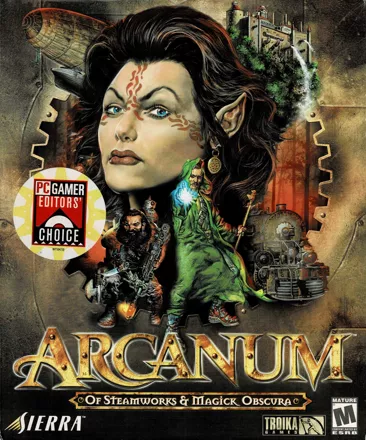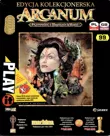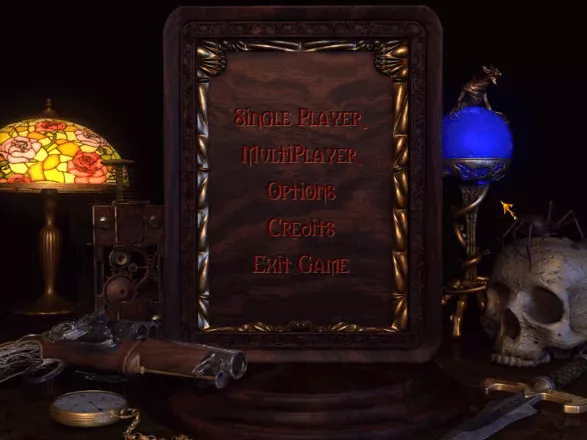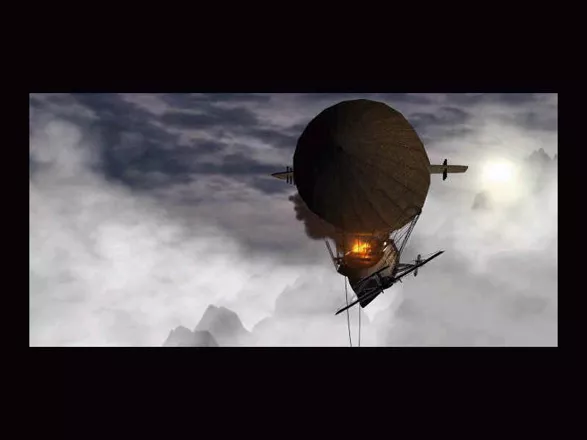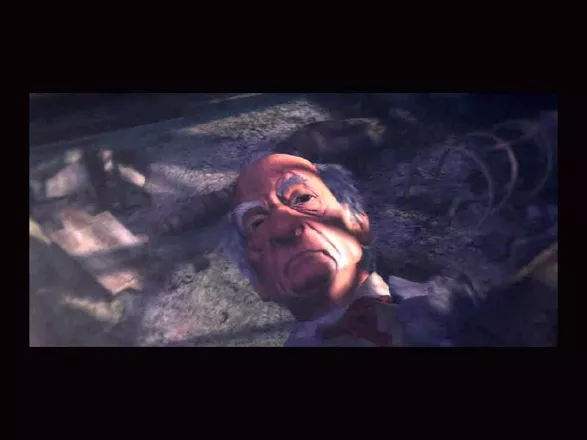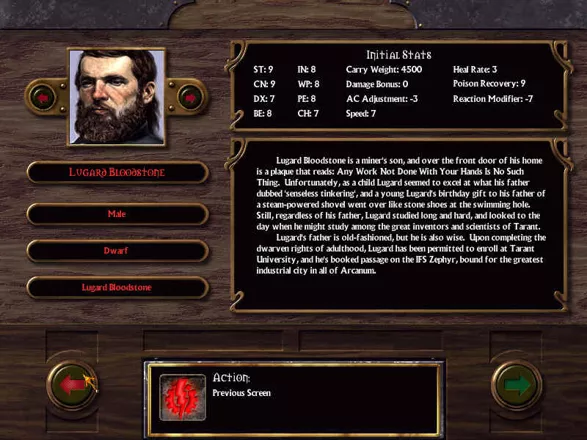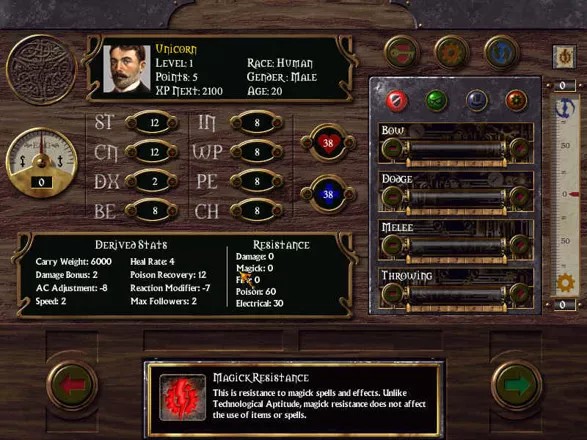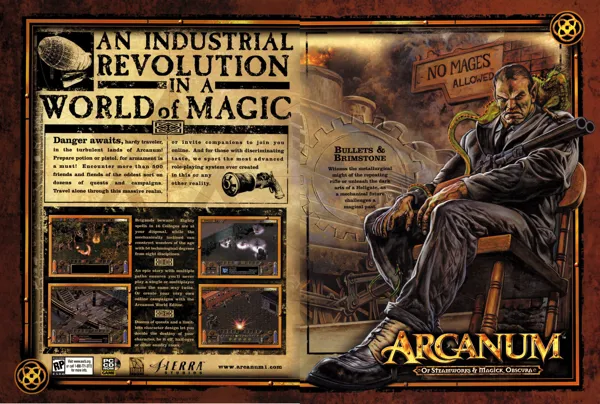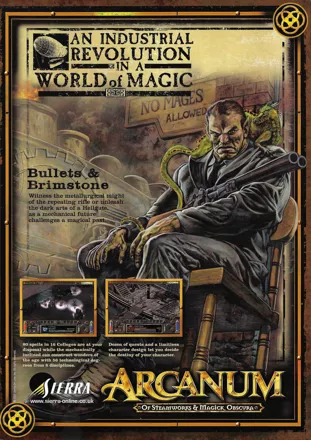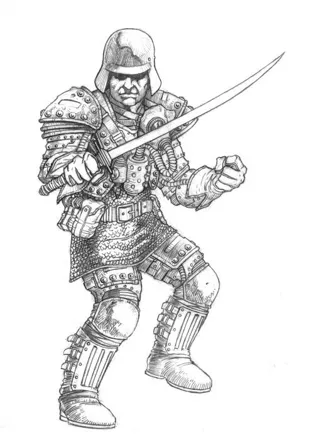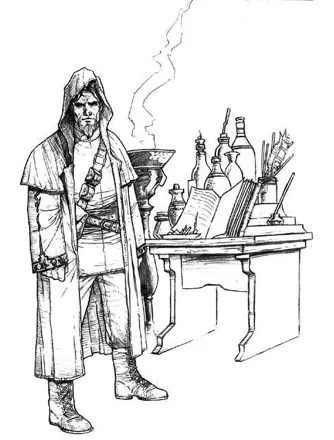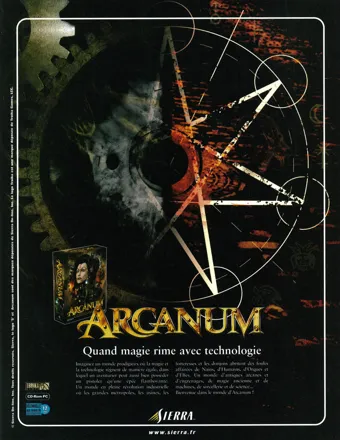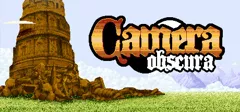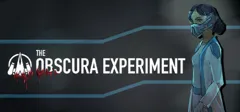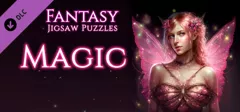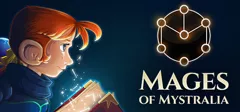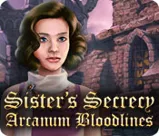Arcanum: Of Steamworks & Magick Obscura
Description official descriptions
The luxury zeppelin IFS Zephyr begins her maiden voyage from Caladon in the Kingdom of Arland to Tarant, one of the largest cities in the technologically advanced Unified Kingdom. Suddenly, while the zeppelin is cruising over mountains, two monoplanes attack it and eventually shoot it down. The two half-ogre attackers die in flames along with all their victims except two who miraculously survived. However, one of them, an old gnome, is mortally wounded. Just before he dies, he gives a silver ring to the other survivor and tells him to "find the boy". The witness of the crash, a man named Virgil, declares that the now only survivor is "The Living One", a reincarnation of a deity, and offers to follow him wherever he goes. The hero begins a long and perilous search for the mysterious boy, the origins of the silver ring, and the unknown enemy who was behind the attack on the zeppelin.
Arcanum is a role-playing game similar in concept and many gameplay principles to Fallout. It is set in a unique world, which can be described as mixture between Tolkienesque fantasy, steampunk technology and elements of British and North American culture of the 19th century: dwarves may carry molotov cocktails, and a half-orc protagonist can travel by train between Victorian-like cities. Magic and technology are opposed to each other; most humans and dwarves embrace technology, while some elf clans stick to the old ways and consider scientific progress evil.
In the beginning of the game the player creates the main character, choosing from a variety of races, attributes, magical or technological disciplines, social skills, backgrounds, etc. When the character levels up, the player can increase his main parameters as well as any available skills. Like in Fallout games, the player directly controls only one character; however, companions who join the party may be given orders, and their inventory can be managed by the player.
The game is open-ended: the player is free to explore the vast world from the onset, undertaking a large amount of side quests or following the main story. Social interaction plays a significant role: depending on the player character's charisma and intelligence attributes, as well as persuasion skill, many problems can be solved in a non-violent way. The amount of companions willing to follow the protagonist also depends on the latter's charisma rating; companions may also leave the party if they disagree with the hero's behavior.
The player can select one of the three combat modes for the game: real-time, turn-based, and fast-paced turn-based. Turn-based mode is similar to the combat in Fallout games: characters require action points to move, attack, or cast spells.
The game includes an editor called WorldEdit, which allows players to create their own maps, campaigns, and non-playable characters. Objects from the base game can be carried across to the player-created scenario. The scenery editor allows players to create their own objects. It is also possible to set and change game variables, i.e. the amount of skill points required to perform a specific task.
Spellings
- 奥秘:技术与魔法 - Chinese spelling (simplified)
Groups +
- BestSeller Series (Cendant / Havas / Vivendi Universal) releases
- Fantasy creatures: Dwarves
- Fantasy creatures: Elves
- Fantasy creatures: Gnomes
- Fantasy creatures: Halflings / Hobbits
- Fantasy creatures: Orcs
- Gameplay feature: Alchemy
- Gameplay feature: Brothels
- Gameplay feature: Character development - Skill distribution
- Gameplay feature: Gambling
- Gameplay feature: Karma meter
- Gameplay feature: Multiple endings
- Middleware: Bink Video
- Physical Bonus Content: World Map
- Protagonist: Female (option)
- Sound engine: AIL/Miles Sound System
Screenshots
Promos
Videos
Add Trailer or Gameplay Video +1 point
See any errors or missing info for this game?
You can submit a correction, contribute trivia, add to a game group, add a related site or alternate title.
Credits (Windows version)
157 People (118 developers, 39 thanks) · View all
| Project Leader | |
| Lead Programming | |
| Programming | |
| Design | |
| Animation | |
| [ full credits ] | |
Reviews
Critics
Average score: 79% (based on 61 ratings)
Players
Average score: 4.0 out of 5 (based on 168 ratings with 13 reviews)
Seems to be mything something.
The Good
The gimmick behind Arcanum is that it’s a fantasy role-playing game with technological elements. Thus, a steam-driven train might take you past the burial grounds of a dragon, halfling thieves might shoot at you, or you could fight a mechanized spider in a dungeon illuminated by electric lights. This does not mean that magick and technology work in concert however. One of the many storylines in this game deals with the struggle between magick and technology. This plays out in several ways regarding character development and means that as you progress towards either technology or magick, your ability to use the oppositional skills wanes. And it draws interesting parallels to the often antagonistic struggle between science and religion in our world.
So the question then, is how well does the gimmick work? Like the Fallout series, Arcanum presents a class-less role-playing system. As your character progresses you may specialize in thief-type skills, magic ones, etc. and through this create your class. Unlike Fallout, as a fantasy game you have your pick of races including human, elf, dwarf, and orc. These races have unique benefits and detriments and some close off gender options- Gnomish women, for example, are never seen. Arcanum does not make use of Fallout’s SPECIAL attribute system, but presents a similar one, which like Fallout, really affects game play. Most RPG’s don’t well integrated attribute systems, but every statistic in Arcanum really affects gameplay. Intelligence determines conversation options, Beauty affects how people react to you and Dexterity determines how fast you move. There are also statistics such as hit points and fatigue which are based on combinations of attributes and the level of your attributes determines how far you can advance in certain skills.
Which brings me to the skill section, which is the most complex system I’ve seen in any RPG. The skill set is broken down into three sets: character skills, magic skills and technological skills. These sets are then broken down into subsets such as combat, specific magic school or specific technological discipline. As you advance in level you apply points to these skills to increase your ability. You can also receive training in the character skills and advance from Apprentice to Expert to Master. Often training is purchased, but Master’s require special quests. Now you can also apply points to your attributes and you only receive one point per level. Therefore, deciding how to spend these precious points becomes strategic.
One final thing regarding the character: alignment. Your character begins the game with a neutral alignment. Depending on your actions (the quests you complete and your interaction with people) your alignment will shift towards good or evil. This is a dynamic system which does away with the complications of the traditional AD&D system and works very well within the game.
Actual game play resembles other RPGs, perhaps too much. You go on many mini-quests while uncovering the larger story. Talk to dozens (hundreds) of people and gain followers. Opinion of the usefulness of the followers seems to be mixed, but I felt like mine were great characters that did far more than carry heavy equipment. I was never able to make use of my dwarven technologist, but I think this was more my fault than his. They have wonderful conversations, fought very well, had interesting reactions between themselves and added to my enjoyment of the game.
There are many areas to explore and several major cities. Talking to the people in the cities results in useful information and interesting quests. During the game I played, I had to solve several murders, track down missing nobles and I found a fun X-Files themed conspiracy regarding half-orcs. There was seldom a time when I did not have at least one quest to work on and I usually had several on the backburner.
Graphically, this game is dated since it does not use 3D graphics, the graphics are good but result in some performance issues. Sound is wonderful. The string score is beautiful, voice work is consistently well above average and ambient noises are realistic and appropriate.
This is a very long game but highly replayable. As a non-thief character, I missed the extensive thieves’ underground, as a melee character I never got far into magic use and technology, and as a good character I didn’t touch on the dark side of Arcanum (however I did perform some evil acts for the greater good and some of my good acts resulted in bad outcomes). Finally, like the Fallout Series, at the end of the game, you get to see how your adventures affected the places you went traveled to.
The Bad
While the story in Arcanum was very good, it is unclear for most of the game. I think I prefer games where you know what points is from the get-go. Several major themes seem to disappear near the end of the game including the one with hero/villain technologist Gilbert Bates (Bill Gates?). Although, this could just be how I played the game. I also wished for more of the steam-punk, Victorian fantasy setting that the box seemed to advertise. While there was a mix of magick and technology in the game, most of the Arcanum world is entrenched in a pseudo-Tolkien setting. Pratchett’s Discworld books present a similar idea more convincingly.
The attribute/skill section I described above is very complex and since the game has a level cap it pays to plan ahead. I was very unhappy with the level cap because I wanted to do more with my character and if you can’t advance in level any more- why go on quests? I found myself very apathetic towards the end of the game, tired of the subquests and solely interested in the end of the game.
Of course one of the reasons for the level cap is the extremely poor balancing in the game. I was simply too powerful too soon. I was also very wealthy, so money oriented quests didn’t matter and I had all the items I wanted. While the ability to increase your attributes was fun, I was able to become almost superhuman. I think they needed to reconsider this element in favor of the traditional RPG feeling that attributes are carved in stone and only acts of God can change them.
While I mentioned some interesting quests, too many of them involved searching dungeons for a person/item. With all the dungeon crawling combat, you level up way too quickly. In short, elements of this game suffered from the Monty Haul syndrome discussed in AD&D books. RPGs have to be about more than who has the more points/gold, etc. By the time I got to the final battle, it was a joke. I was successful in a few minutes and never felt in any danger. The story and framework of Arcanum deserve more than a Cheaterz Diablo-type romp.
Finally, I mentioned that graphics were outdated. On my new system, I experienced several lock-ups because the game wasn’t making use of my 3D card. Characters weren’t particularly well animated, combat animations were minimalist, and the dungeons were visually unimpressive. There were some excellent rendered scenes, but they occur late in the game.
The Bottom Line
I played this voraciously and still don't know how I feel about this game. I definitely want to replay this game as a completely different type of character. As it stands now, I'd describe it as a failed masterpiece.
Windows · by Terrence Bosky (5397) · 2003
A fine, fun RPG in an original (at least in games) world.
The Good
This game generally fulfilled its vision of a new setting and story with the same sort of flexibility that worked for the Fallouts. The number of possible character choices and development paths is significantly greater and more diverse than in the earlier games. The interplay of magic and technology, and the different feel of each, is interesting. The evocation of a Victorian English feeling (with some more modern conspiracies below the surface) is particularly wonderful.
Perhaps most promising, the developers seem to have mostly grown up since Fallout2. The sophomoric "humor" is mostly replaced by more interesting and better developed characters. There are moral dilemmas and issues to think about. Many of the factions are drawn in moral grays instead of melodramatic monochrome.
Although some have complained about the "sexism" in the game, including both the lack of female art for two of the playable races (a production cost decision) and the inclusion of some gender discrimination in the world and character reactions (an integral part of the success in producing a Victorian flavor for the game world), I did not find the game particularly prejudiced, and in fact there is a strong subplot around issues of racism and racial exploitation.
The Bad
Not all characters are created equal - there were some balance issues.
One of the most interesting side quests was unfinished, and just leaves the player dangling.
The desire to make a "toolbox" game was not carried far enough to really catch on - in particular third-party adventures can't have a world map - but it was carried far enough to limit options for game scripting.
There were some annoying bugs in the UI even in the final patch.
Managing NPCs in your party was done well in general, but a technical character was not allowed to purchase items for magical followers and vice versa - shopkeepers refused to interact with opposite-aligned characters entirely.
The game was a slug on the best machines available when it shipped.
The Bottom Line
A fine, though not perfect, game and a landmark in CPRGs.
Windows · by weregamer (155) · 2003
Voi ch'entrate lasciate ogni speranza (Dante, but not the one met in Ashbury)
The Good
You WANT to play this game. It's Fallout garbed in Wild Wild West and
Dungeons and Dragons finery, with scents of Ultima VII. You want to play
until you have figured
the use of all those trinkets, filaments, metal shavings, sprockets,
watch mechanisms, and so on, and so on. Until you have built something
out of a broken flintlock pistol and a small tube (answer: a working
flintlock pistol). Until you have pieced together the fascinating
story of this engaging parallel world. Perhaps I have explored as much as
one hundredth of
the world of Arcanum, perhaps as little as a thousandth.
I want to see more, to explore it all.
Most likely, I never will. Why?
The Bad
It started gradually, my annoyance growing slowly, slowly. Little, tiny
wee pieces of aggravation which I was all too willing to put up with, so
eager I was to play on. Then it exploded like a soap bubble. Joachim's
trail of notes told us, Virgil and me, to go next to Stillwater.
Oh, we'd come across a mention of Ashbury too, but Stillwater seemed the
logical next stop. No Stillwater, no Ashbury on the World Map when
we consulted it, though. So we decided to board the train in
Tarant. As I went to buy tickets at the booth, my mouse pointer
turned into a sword. Wot? Combat mode? What had I done to deserve
that? I quit, reloaded, and was careful to watch my step this time. Combat
mode again?! Was it something I'd eaten? (too much garlic, maybe?).
After a few reloads, Virgil and I just decided to walk to Black Root
and board the train from there. All went well. So the Tarant incident
must have been a bug. But... wot? Stillwater was not on the time
table, but Ashbury was. So we rode to Ashbury, which then, and only
then, showed up on the map. We really had no interest at all in
fixing their problem with the ghouls, zombies, and assorted undead
in their cemetery, and Dante, who had eagerly joined us, seemed such
a shady necromancer type that we quit again, and reloaded. That is
when the bubble burst.
The bugs, the inept combat, the needle-in-a-haystack errands, everything.
The bugs. I just mentioned one. Another is during combat, when your followers, or the beasties, appear to go into an infinite loop, leaving you there, waiting for your turn, forever and beyond. And then, the odd screen freezing solid, but we're used to that.
The inept combat. The blurb on the game box is a farce. Don't you believe a word of it. The so-called turned-based combat allows you no tactics. In Fallout, like in X-COM Enemy Unknown, you know in advance the cost of moving here or there, and how many movement points you will have left for an attack. In Fallout, for every weapon you had, you knew the cost of using it, so many movement points for a shot of the sniper rifle, so many for the Desert Eagle pistol, so many for the sledgehammer, and so on. Nothing of the kind here. You just now how many movement points you have and the "speed" of your weapon, whatever that is. But you never know how many moves away you are from your target, how long it takes you to reload... why, as far as I could figure out, there was no reloading time, so that the only difference between a one-shot flintlock and a six-shot revolver was only damage and range. This is grotesque. Reloading a flintlock must have taken 30 seconds in real life. Shooting the next round of a single-action revolver? Cock the hammer, pull the trigger. A split second. Now all those things were nicely taken care of in Fallout. Here? Nothing. Combat has become a mindless brawl, a sorry farce. And I am cutting it short. I could rave on for two pages and more, count your blessings.
Next, the maps. Everytime you enter a town you can bring up a local map of it. The map is unrealistic and useless, because there is no "fog of war" so that the parts you have not explored are just as clear to see as those you have, and, typically, you never know whether you've already been here, or there, or if it remains to be explored. There is worse. If you have strolled along, oh, say, Devonshire Way in Tarant, and looked at the number plates of the houses there, they will show as question marks in the map, and, hovering your mouse pointer over them, the addresses will be revealed (good)... but not all places so observed will show with a queriable question mark (bad, very bad). Try that in Black Root especially. Some of the locations will have been recorded on the map, most not. This is particularly infuriating when, having found Sarah Boone in Dernholm, solved her problem in Tarant, and hoofed it back to Dernholm to tell her the good news... you have forgotten where she lived, and you have to visit every single godforsaken shack in godforsaken Dernholm to find her again (no-one you meet knows about her). Your journal is completely, utterly useless there. Why, you can't even jot down your own blog in it (remember Ultima Underworld?).
So Virgil and I resolved to download the two patches (5.4M in all), in the fond hope that they would make the game playable at last. We had learnt our lesson, too, namely, that if you take on many quests (errands, rather) you soon become lost. Er... yes... we got Colonel Eric von Stroheim's silver dentures from the Dark Elven Ruins, but where does he live again? With a great deal of luck your Journal has it: 36 Alexandrov Prospect. But in what city? Tough luck. You should have made a note of it on good old real paper with a good old modern real ballpoint pen. Imagine: all those technological gadgets in Arcanum, and they didn't even think of inventing the PIP Boy! Or at least, some proper paper and a proper goose quill, to keep with the Victorian England retro style.
So Virgil and I started all over again, from scratch, swearing never to take on a new quest until we had solved the current one.
And thus we came to the Mayor of Black Root, burdened as we were with the task of convincing him to pay his back taxes to the King of Cumbria in Dernholm. The mayor asked us to find his ceremonial dagger, his symbol of office, stolen by thieves "on the outskirts of town". We searched the outskirts of Black Root high and low, left, right and centre, east, west, south and north, to no avail. We interrogated every single living soul in Black Root. Not a clue. We downloaded a walkthrough, which said: follow the path leading out west of town, eventually you will find the thieves' camp. We did follow the path, and beyond, when the path petered out. Nothing. We trekked back and forth, forth and back, south and north, north and south, west of Black Root. In vain. And no wonder, a screenful covers an area of about 20 metres by 30, and after trudging 20 screens worth at least, you still find yourselves only a pixel away from your point of departure on the world map. We switched to the world map view, picked a point a longish way due west of Black Root, clicked "Go". Never a whiff of a thieves' camp.
Navigating the local maps is an infuriating business. Want to go from Madame Tussaude's to Delores Boston's place to deliver a crystal ball? Theoretically, you scroll the map, mark way points by clicking, then click the "Go" button and there you... go. First, why do you need intermediate points? Why can't you just click on your destination and be done with it? Second, you often get this hair-tearing message: "your path is blocked" when, in fact, the two points are within plain view of each other, without a single obstacle in between. Third, sometimes, you just don't make it there because a wandering pedestrian has chanced into your path, and the AI is too stupid to have you walk around him. You have to take over and do it yourself.
A similar "path blocked" message often flashes on the world map when trekking from one city to another, even though there is nothing in the way of your destination. You just have to find another way point, not "blocked", a few pixels away.
And the world map is bogus. I talked Virgil into taking a break on our way to Black Root to take a look at the bridge over the river (what's its name? No names for those rivers on the world map). I was expecting a breath-taking view of a feat of Victorian engineering. I clicked on a point carefully picked slap bang in the middle of the picture of the bridge... go! When we got there, lo and behold... no bridge, no river. Just grass. We went in ever widening circles looking for the bridge. We didn't even find the river. But just try clicking your first way point on the west side of that non-existent river, the second on its east side... "path blocked". To get through, your two way points must straddle the bridge exactly. Ridiculous.
The Bottom Line
1. Combat is a brainless, preposterous farce. Don't put up
with it: find a character editor and pump up your and
your followers' strength and dexterity right up to the
maximum.
-
Don't rely on your "journal", keep your own, either on physical paper using a physical pen, or repeatedly hitting Alt-Tab to access your favourite word processor (mine is NoteTab).
-
Be prepared to be frustrated.
Windows · by Jacques Guy (52) · 2004
Discussion
| Subject | By | Date |
|---|---|---|
| [false alarm] glitch: no speech? | Rola (8483) | Oct 20, 2018 |
Trivia
Graveyards
A hidden graveyard, containing tombstones of Arcanum's most diehard fans, can be found at the location W: 1060 S : 809 on the world map. Another graveyard has lots of humorous epitaphs written on the graves. However, many of them are taken directly from Baldur's Gate.
Manual
Following on the tradition started in the Fallout manuals, Arcanum's manual includes an actual cooking recipe. This time it's Grandma Cookhill's Three Bowl Bread.
Mod pack
On 7 January 2002, the development team released a free mod pack, containing six new and exclusive adventures. It can be downloaded here.
Mods
Chris Beddoes has produced a mod for this game that addresses some balance issues, makes it overall a little more challenging, and replaces the entire opening area and quests. This latter is important because the opening area was used in the demo, and many players have just seen it too many times to want to start a new character any more, despite the near-infinite possibilities for character design. It can be found here.
References
- There's a location in the game called the "Isle of Despair" which is a penal colony which holds it's inmates in a remote island behind a magical barrier that makes it impossible to escape. Now, when asking the generic NPCs for its location, they answer:
"You mean the Black Isle? I'm not quite sure..."
Black Isle Studios is the name of Interplay's RPG division, and the former home of Arcanum's development team.
- A portion of the Stillwater giant quest contains a major (and fairly obvious) reference to Monty Python and the Holy Grail, specifically the part where you have to trace the beast to a cave and capture it. In fact, the whole sequence plays just like in the movie, you follow some giant footprints, enter a dark cave filled with bones and dead bodies, and so on.
- There's a Fallout reference in the walled city of Tulla. Apparently one of the students had to venture out in the Wastes to find a Water Gem. He has since returned and the Mages fear how the journey changed him and the influence he might have on other students. Plus, he's wearing mechanized armor.
- There's actually a reference to Bill Gates and Microsoft stealing the ideas for their Windows operating system from Apple's MacOS. One of the most influential and wealthy of people in Tarant is Gilbert Bates (Swap the G and B in Gill Bates and you have Bill Gates) because he brought the power of the steam engine to mankind. Another steam engine developer, called Cedric APPLEby is spiteful of Bates's success and claims that he invented the steam engine first and that Bates had stolen the idea off him.
Server shutdown
The official online servers were shut down on 1 November 2008.
Soundtrack
The soundtrack to Arcanum was composed by Ben Houge for string quartet and was provided in its entirety on Computer Gaming World's May 2001 demo CD.
Both the soundtrack and its sheet music are available as a free download.
Stillwater giant
Despite the result of the associated quest, the Stillwater giant DOES exist. It can be found on a random encounter between Stillwater and the pass to the elven city.
Information also contributed by Rambutaan, Sciere, Terrence Bosky, uclafalcon, Unicorn Lynx, weregamer, Wojit and Zovni
Analytics
Upgrade to MobyPro to view research rankings!
Related Sites +
-
Arcanum Walkthrough by Quandary
by Steve Metzler -
Developer's Site
Troika's Arcanum page -
Hints for Arcanum
Having trouble with Arcanum? These hints are arranged in question and answer form to help you solve it on your own. Includes complete solutions. -
Mike's Arcanum Resources
A really good Arcanum fan site with many things you can't find elsewhere. -
Official Arcanum Website
The Official Sierra: Arcanum Website (English) -
Official website (german)
Official website (german) -
Sierra: Arcanum - Soundtracks
The Arcanum soundtrack is officially available for download here! -
Terra Arcanum
Wonderful fansite with walkthrough and good gameplay hints.
Identifiers +
Contribute
Are you familiar with this game? Help document and preserve this entry in video game history! If your contribution is approved, you will earn points and be credited as a contributor.
Contributors to this Entry
Game added by Unicorn Lynx.
Additional contributors: Zovni, Kaliban, Indra was here, Jeanne, phlux, JRK, tbuteler, jsbrigo, Alaedrain, Patrick Bregger, Plok.
Game added August 25, 2001. Last modified April 5, 2024.
